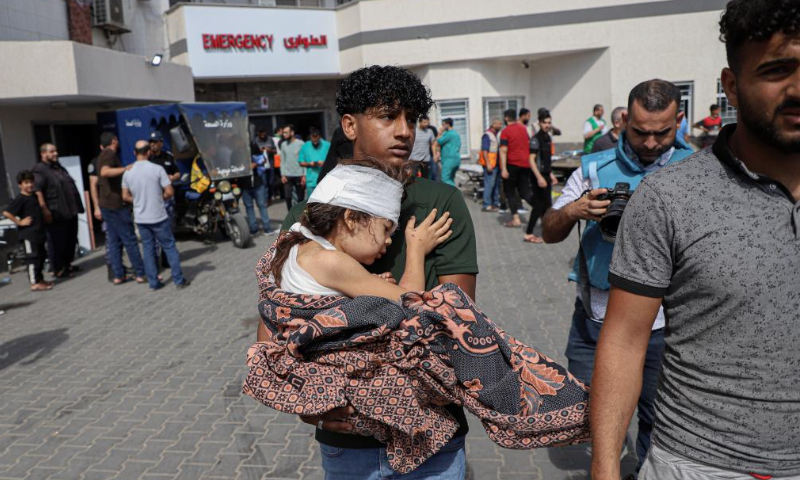The United Nations Security Council (UNSC), consisting of 15 member states, voted on October 18 on a draft resolution regarding the Israeli-Palestinian situation. The US cast the sole dissenting vote, leading to the resolution’s failure to pass. China expressed shock and disappointment at this decision, which is not exclusive to China but represents a general sentiment within the international community. Even the US’ allies, Japan and France, voted in favor, choosing to stand with the just forces of the international community, leaving the US standing alone on the opposite side.
The draft resolution submitted by Brazil sends a clear signal, which is to prioritize achieving an immediate comprehensive ceasefire above all else. This reflects the most significant consensus within the current international community. However, it was vetoed by the US, resulting in direct and severe consequences.
The situation in Gaza is escalating, with more civilians losing their lives and suffering. The recent tragic incident where over 500 people lost their lives in a hospital in Gaza due to an airstrike has made the situation even more urgent. Every minute and second counts, and there is an urgent need for swift and decisive action by the UNSC. All countries genuinely concerned about the humanitarian disaster in Gaza are making maximum efforts. The US veto is stained with the blood of innocent civilians, and it is a grave injustice. It not only prevents collective action by the UNSC but also sends an extremely negative signal, indicating that the UN cannot ensure basic international humanitarian principles at critical moments. In fact, this gives a green light to those who do not abide by international humanitarian law.
The reasons for the US veto are increasingly untenable and appear to be mere excuses. The US claims it voted against the resolution because it didn’t mention Israel’s right to self-defense. However, as the French representative pointed out, there is no contradiction between the resolution and Israel’s right to self-defense. The contradiction lies with the US. On Monday night, the US vetoed a resolution proposed by Russia, citing the absence of condemnation for Hamas and expressing a willingness to use the Brazilian proposal as a basis, requesting more time to seek consensus.
While this was somewhat regrettable, it also provided hope that the Brazilian proposal might pass. In the over 40 hours before the vote, the US neither commented on the Brazilian resolution nor indicated opposition, further raising expectations that the resolution would be adopted. Nevertheless, the US still cast its veto, which is truly unbelievable and raises doubts about whether the US really wants the UNSC to take any action and genuinely solve the problem.
The Brazil-drafted resolution condemns all violence and hostilities against civilians and all acts of terrorism, urging all parties to act in consistent with international law. It also calls for the continuous, sufficient and unhindered provision of essential goods and services to civilians, the rescission of the order for civilians and UN staff to evacuate all areas in Gaza north of the Wadi Gaza as well as the ensuring of humanitarian assistance. The draft resolution in general reflects the universal call of the international community and represents the initial steps taken by the UNSC to promote a ceasefire. It may be the only text that the UNSC can reach a consensus on in the current situation. If passed, it is believed that it will play a role in achieving a ceasefire, protecting civilians, and avoiding a greater humanitarian disaster.
However, the draft resolution was easily blocked by the US with a veto, reflecting the deep-rooted disregard of the US for the humanitarian disaster in Gaza. The US, which often talks about human rights, reveals its true face when it comes to the urgent moment when a large number of civilians’ right to life is trampled upon. This incident has also attracted considerable attention in the US public opinion. The New York Times stated that the UN Security Council displayed deep divisions when it failed to pass the resolution; CNN said that the veto sparked “more criticism of political paralysis in the powerful global body.”
The veto from the US has not only violated the most basic morality and justice, but also damaged the authority and credibility of the UNSC, weakening the ability and willingness of the international community to maintain peace and security. The “inability” of the UN in upholding international humanitarianism today is directly caused by the US’ disregard and deviation from international humanitarianism. The Security Council needs to make changes and cannot remain stagnant. The international community needs to increase moral condemnation of such behavior by the US, exert pressure, and urge it to quickly turn away from standing in opposition to the international community.
The biased attitude of the US is one of the root causes of the long-standing Palestine issue, and it acts as a catalyst for escalating the conflict when it erupts. Currently, the international community must prioritize achieving an immediate comprehensive ceasefire to prevent the war from turning into a catastrophe that engulfs the entire region. The US bears the greatest responsibility in this regard and cannot evade it.













